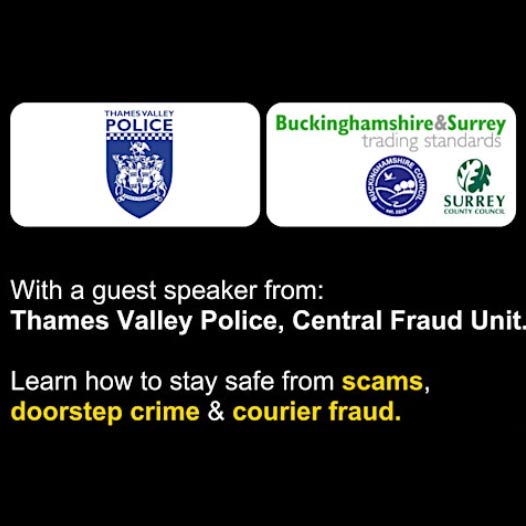Of all crime types, residents are by far most likely to become victims of frauds or scams. The National Crime Agency estimates that fraud accounts for over 40% of crime in England and Wales. That is almost certainly a gross underestimate as the Crime Survey of England and Wales estimates only 13% of cases being reported to Action Fraud or the police by victims. Four fifths of reported fraud are cyber-enabled according to the National Fraud Intelligence Bureau.
Protection through knowledge and understanding
The subject of Frauds and Scams, and the sheer scale of the problem, is too large for the Forum to deliver a comprehensive account of the threats and how to combat them. Anyone can fall victim to unscrupulous fraudsters, in a multiplicity of ways. Even for crime agencies, it would be impossible to direct enough resources at this crime type. That’s why, in addition to explaining what IS being done, our main focus as the Forum is:
- to drive home the message that, however hard Government, Police and other agencies work, the sheer volume of crime and the ruthlessness and ingenuity of criminals mean that the threat will never disappear;
- to encourage REPORTING of frauds and scams via the prescribed route(s), not just in the hope of a positive outcome to your own case, but also to help build the intelligence picture;
- most of all, to emphasise that prevention, understanding threats and appropriate actions, is by far the best approach to keep ourselves safer.
- our news posts (see alongside and on our Community News page) will highlight instances of scams and frauds, and deliver advice which we hope will enable residents to make themselves as secure as possible.
Reporting Fraud via Action Fraud
All fraud cases nationally should be reported to Action Fraud (AF).
Action Fraud Online Reporting page
Reports are logged and then passed to the National Fraud Intelligence Bureau (https://www.actionfraud.police.uk/what-is-national-fraud-intelligence-bureau) for assessment, analysis and data matching.
Reports are then sent to local police forces/law enforcement agencies for investigation.
Combatting Fraud – the national Picture
Government and Policing have a structure at all levels to address this most prevalent crime type. However, those less au fait with the Strategic Policing Requirement, the National Fraud Strategy, the role of the National Crime Agency, the Thames Valley Police and Criminal Justice Plan etc, may not appreciate the serious work towards joined-up thinking and appropriate resourcing to combat fraud. Here are some resources:
Strategic Policing Requirement 2023
National Fraud Strategy: stopping scams and protecting the public
Thames Valley Police and Crime Commissioner – Police and Criminal Justice Plan 2021-2025
Combatting Fraud – the Industry Picture
UK Finance’s main objective is to support a thriving finance industry, vital to the UK economy and society. An essential part of this is to ensure that the ‘system’ is secure and trusted, and hence it is very active in the fight against economic crime.
Representing 300 firms across the UK finance industry, UK Finance’s reports carry some authority. Its Annual Fraud Report 2024 (published May 2024) puts the total stolen from consumers in 2023 at £1.17 billions, with 2.97 million confirmed cases. On the other side of the coin, it says that £1.2 billion of ‘unauthorised fraud’ was prevented.
The Report lists a whole range of activities undertaken by it and its members. But, echoing the Forum’s message, one of the key programmes remains Customer education and awareness campaigns.
UK Finance is also campaigning for the ‘enablers’ of fraud to take more responsibility in fighting fraud. By this, it means especially tech and telecomms companies. It estimates that 78% of ‘Authorised Push Payment fraud’ (in which individuals or businesses are tricked into transferring money) originates online, and 16% via telecomms. These figures again hammer home the need to be cautious about approaches from such sources.
Read the UK Finance Annual Fraud Report 2024
Combatting Fraud – the Force Picture
‘Fighting cybercrime and fraud’ is one of the 5 central planks of the Thames Valley Police and Crime Commissioner’s Police and Criminal Justice Plan’
The National Fraud Strategy spells out that local police forces must bear the brunt of fraud investigations: “Local police forces across the UK and ROCUs in England and Wales will continue to be responsible for the vast majority of fraud investigations in the UK, as well as leading on support for victims and businesses in their local areas.”
Thames Valley Police’s Central Fraud Unit
- Fraud is investigated at a local level, through a central dedicated unit with the time and skills to pursue complex investigations without competing demands placed on area based officers.
- When we enquired (March 2024), the Central Fraud Unit at Thames Valley had 4 dedicated investigation teams, each led by a Detective Sergeant with 7 constables, so 32 dedicated investigators who deal exclusively with fraud.
- At a weekly tasking meeting, decisions are taken on which cases to take up, based on threat, harm, risk, public interest and current capability/capacity.
- The High Harm Fraud team carries out mainly romance fraud and courier fraud investigations. For further information on TVP’s approach to romance fraud, the following BBC podcast may be of interest: https://www.bbc.co.uk/sounds/play/p0hbpmfg
- There is a volume fraud team for each county, dealing with a variety of fraud cases.
- At the time of our enquiry, there were approximately 160 live investigations across the teams.
- Exceptions to reporting to Action Fraud are where the ‘call for service’ (CFS) criteria are met. This is where a victim is vulnerable, the offence is happening now, or evidence will be lost if not attended straight away. This ensures early response to those cases that need it. This relates to a small number of cases and in the majority of circumstances reporting to Action Fraud is the correct course.
- TVP is fully engaged in the banking protocol process and prevented over £2 million worth of losses through this in the last year. https://www.consumercouncil.org.uk/consumers/help-consumers/financial-services/banking-protocol
Links and Resources
Neighbourhood Watch – Scams and Fraud
Neighbourhood Watch – Cyberhood Watch
Buckinghamshire and Surrey Trading Standards
GetSafeOnline.org – practical advice on protecting yourself, your computers and mobile devices and your business against fraud, identity theft, viruses and many other online threats.
Recent News Items
Free webinar – Staying safe from scams, artificial intelligence (AI) fraud & cybercrime
Avoiding Courier Fraud
Avoiding Investment Fraud
Ticket Frauds – beware Social Media
Webinar: Scams, doorstep crime & courier fraud
Continue Reading Webinar: Scams, doorstep crime & courier fraud
Phishing email purportedly from NatWest Bank
Continue Reading Phishing email purportedly from NatWest Bank














